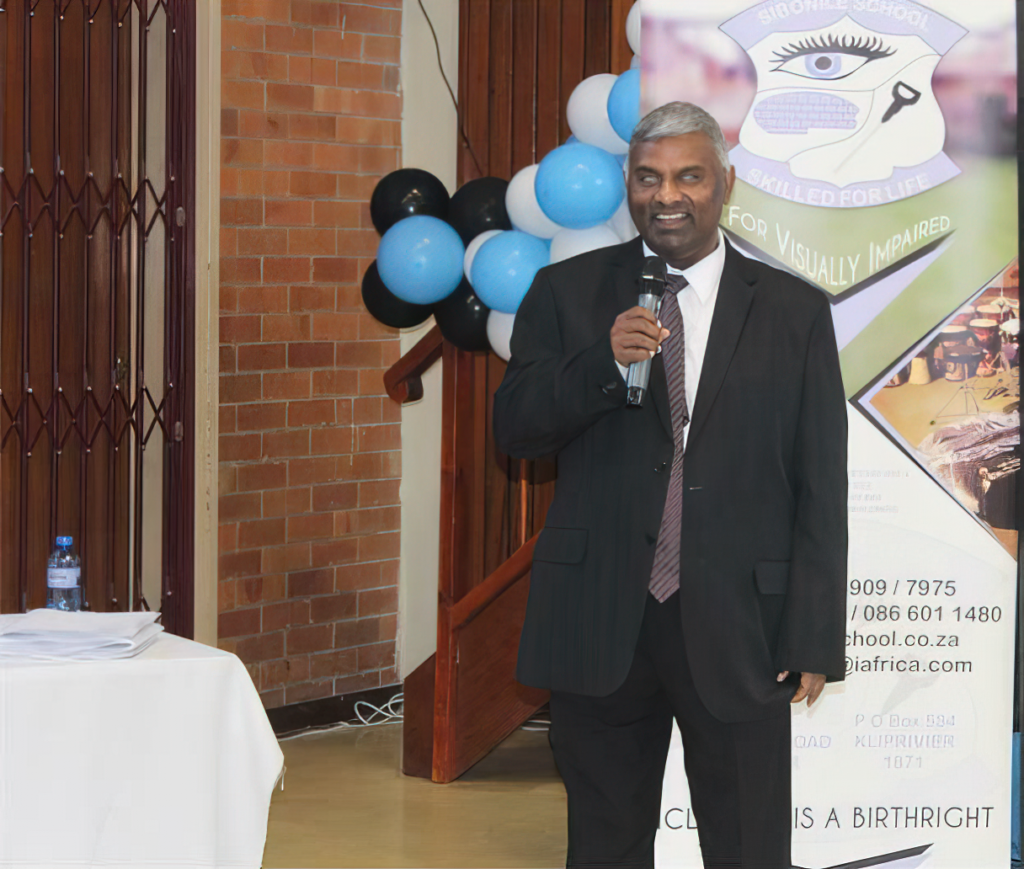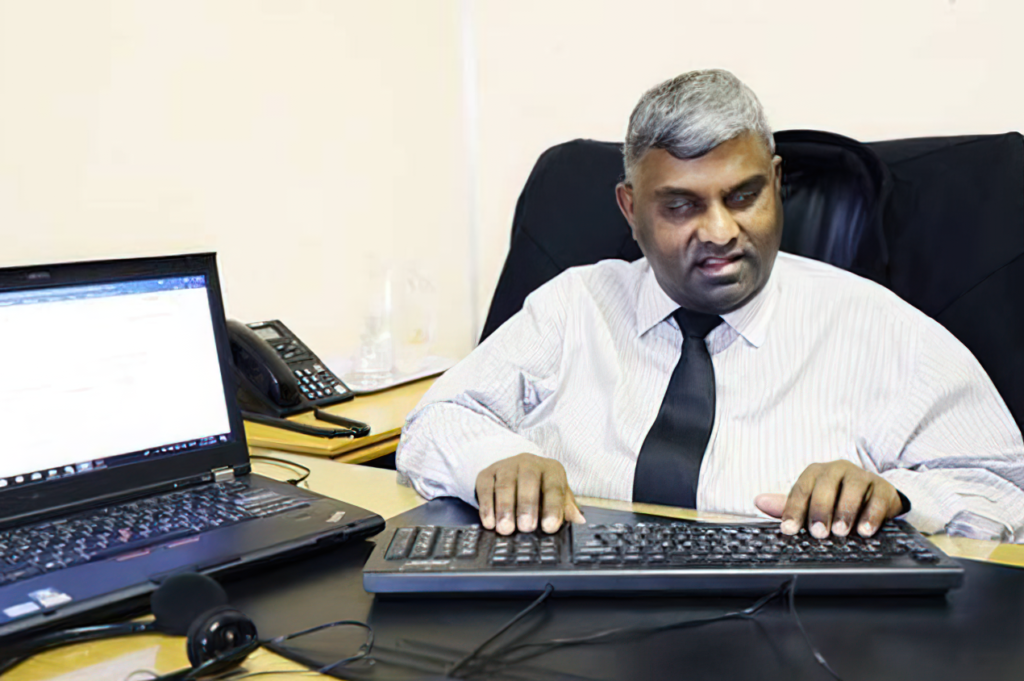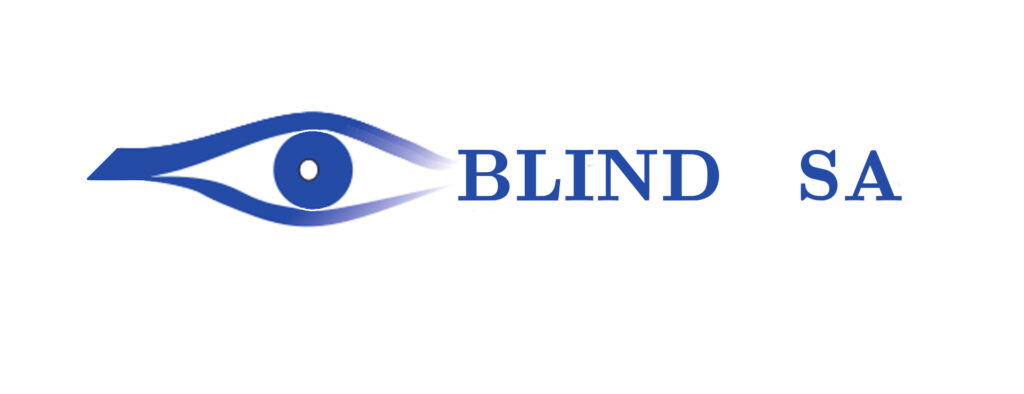For nearly 80 years, Blind SA has been a pillar of hope for blind and partially-sighted South Africans. Currently under the guidance of CEO Jace Nair, they are aiming to grow to new heights, but they require assistance in order to continue their truly invaluable service.
Blind SA is a National Organisation of Persons with Disabilities (OPD) and is registered as a Non-Profit Organisation and Public Benefit Organisation.
First established in 1946 as the South African Blind Workers Organisation (SABWO) by a group of blind citizens to empower unemployed blind people, in 2004 the organisation changed its name to Blind SA.
Blind SA is run through six committees, namely: Accessible Publications; Equipment and Assistive Devices; Advocacy and Information; Economic Empowerment; Education and Early Childhood Development; Women and Gender-Based Violence and Femicide; and Youth. The members of each of these committees are blind and partially sighted volunteers from 49 branches located across the country.
The entity’s operational divisions are Braille Services, Skills Training and Development, and Governance and Community Programmes, while their support team deals with the administration, financial, human resources, fundraising, public relations, and media and communication elements of the organisation. These divisions comprise 43 personnel who are employed together with six interns.
As South Africa celebrates 30 years of democracy, the work of Blind SA has played a major role in ensuring that blind and partially-sighted South Africans have been afforded a chance to thrive in this new era for the country.
Jace Nair, the CEO of Blind SA, is particularly proud of the milestones which have been achieved by his organisation, with their hard work opening many doors for the blind community.
”We’ve worked hard on advocacy, lobbying, self-representation, leadership, and capacity building initiatives. Awareness raising and disability sensitisation has led to representation of persons with disabilities on a number of statutory boards, including the Presidential Working Group on Disabilities,” Nair explains.
”Our inputs into the Disability Act, White Paper on inclusive education, White Paper on the rights of persons with disabilities, the UN Convention on the rights of persons with disabilities, the AU Protocol on the rights of persons with disabilities, White Paper on post school education and training for persons with disabilities, and the like have been hugely impactful.”
Through Blind SA’s Braille Services, the provision of reading materials, especially personal documents, are transcribed into braille at a subsidised cost of 99%. The blind person only pays 1% of the cost. In addition, braille and large print CAPS textbooks are produced for the Department of Education and the 22 Schools for the Blind in the country.
The Skills Training and Development division provides braille, computer, smartphone, orientation, and mobility training, as well as Skills of Daily Living training to enable independent living and mobility.
”The economic empowerment initiatives which we have run include placement of blind and partially-sighted unemployed persons in employment, learnerships, and internships with the public and private sector, as well as entrepreneurial training and SME incubation and development,” Nair continues.
”We have provided these services to tens of thousands of blind and partially-sighted persons, educators, professionals, and family members to date.”
Success stories and challenges
Since the dawn of South Africa’s democracy, Blind SA has a lot to be proud of, including:
- The Gauteng High Court Order in 2019 compelling the Department of Basic Education and Provincial Education Departments to provide accessible CAPS textbooks (braille and large print) to blind and partially-sighted learners;
- The Constitutional Court judgement in 2022 declaring the Copyright Act of 1978 unconstitutional since it violates the basic human rights of blind and partially-sighted persons;
- The provision of COVID-19 literature in braille, large print, and audio to over 10 000 beneficiaries;
- The negotiations with Benetech in the USA to provide the largest global accessible library, Blind SA Bookshare, to South African blind and partially-sighted persons at no charge. Accessible books may be downloaded onto smartphones, computers, book readers, and braille displays. Over 1 900 South African titles were uploaded onto Blind SA Bookshare; and
- The participation of blind and partially-sighted learners in the World Read Aloud Day with Nal’ibali, as well as the initiation of the story writing competition and the use of these stories in the last two World Read Aloud Day events.
While the above makes for wonderful reading, it has not all been plain sailing for Blind SA.
Nair explains: ”The introduction of the new South African bank notes and coins presented a challenge for us. Blind SA had consultations with the SA Reserve Bank, with some of the inputs of blind persons incorporated into the bank notes and coins released in the country in May 2023.
”Blind SA then negotiated with the SARB for ‘Know Your Money’ with facilitators from our branches given training to identify the new bank notes and coins. These facilitators then assisted other blind persons from our branches to become aware of the changes and how to identify the new bank notes and coins. Thousands of blind and partially-sighted persons received this training.”
Another challenge came in the shape of ballot papers for elections. Since 2009, blind and partially-sighted persons were engaged to develop the Universal Ballot Template (UBT), which has been used in the National and Provincial as well as Local Government elections. However, not having these ballot lists in braille is still an outcome to be achieved for Nair and his team ahead of the 2026 Local Government Elections.
”Blind SA also advocated for voter education and the production of the IEC fact sheets to be transcribed into braille, large print, and audio. Blind SA also participated as Election Observers and Peace Monitors at these elections,” Nair adds.
Then comes the issue of banking accessibility, especially the accessibility of banking Apps, internet and telephone banking services, and information about financial services products and legal documents. These are still not available in accessible formats.
”Negotiations with banks have had limited success and negotiations with the Banking Association of SA have not yielded progress. The next step is to litigate the banks in terms of the Equality Act,” Nair avers.
Leading Blind SA’s growth
Since inception, Blind SA has ensured that it keeps to the values and principles of empowering blind and partially-sighted persons and that it continues with its role of advocacy, self-representation, inclusivity, and lobbying for the promotion of basic human rights.
However, for Blind SA to grow and help the many more people that need it, they require the support of external entities, something which Nair is calling on the private sector to assist with.
”The demand for services is growing. As a result, Blind SA would need to engage more therapists, O&M practitioners, and training and economic empowerment officers. There are more requests from Community Based Organisations to affiliate with Blind SA and they will require leadership and capacity building programmes.
”Blind SA also requires laptops and computers, white canes, and braille machines. Blind SA is seeking financial support from corporates, trusts, and foundations to sustain our services.”
Nair is grateful for the continued support shown by the various communities, donors, media outlets, and interested parties who all contribute in keeping the cause alive, but the reality is that more is needed.
In closing, Nair hopes to see the end of discrimination against those with disabilities, as that will afford South African society the chance to move forward as a united force.
”We hope to transform our community so that prejudices and discrimination based on disability, especially the stigma and myths of disability, are changed with the attitudes and mindsets of our community,” Nair concludes.
And we couldn’t agree more with you on that.



Blind SA’s main services
- Advocacy, lobbying, and self-representation.
- Awareness-raising, information dissemination and distribution.
- Provision of assistive devices.
- Assistance for learners in special and mainstream schools and students’ registration with tertiary institutions.
- Accessible publications—Braille, Large Print, Daisy.
- Orientation and mobility.
- Training in ETDP SETA accredited courses and placement in skills training and employment.
- Small, Medium, and Micro Enterprises (SMMEs) development and support.


